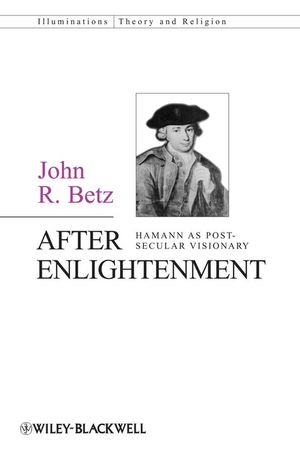After Enlightenment: The Post-Secular Vision of J. G. HamannISBN: 978-1-4051-6246-3
Hardcover
376 pages
November 2008, Wiley-Blackwell
 |
||||||
"Simply put, Betz’s accomplishment is superb. He comprehensively introduces the entire span of Hamann’s work in its theological and philosophical significance … though much remains to be done in thinking with Hamann, Betz’s work is a major accomplishment that deserves wide readership.” —Lutheran Quarterly
“This is an important book for at least two reasons. On the one hand, it is a complete, reliable, and agreeably written introduction to Johann Georg Hamann’s life, work and world. On the other hand, it contributes substantially to the ongoing discussion in contemporary theology and philosophy about the seemingly ineradicable tension between modernity and Christianity.” —Modern Theology
“After Enlightenment has much to offer those who are familiar with Hamann, as well as those who are not. The way Betz handles Hamann’s difficult writings and communicates his thought is a clear and precise manner is praiseworthy … The comprehensiveness of the study is enhanced by the ease of Betz’s prose, offering a tremendous tool for understanding the enigmatic yet fruitful ‘Magus of the North’.” —Journal of the Evangelical Theological Society
“[Betz] has produced the best and fullest survey of the life and writings of Johann Georg Hamann in a generation, helpfully including many passages from Hamann’s letters and publications and commenting intelligently on the style, theology, philosophy, and (to a lesser extent) historical context of Hamann’s notoriously obscure oeuvre; second, he has written an intellectual history covering Hamann’s relation to the major figures of his time as well as his subsequent influence on and reception by philosophers and theologians down to our own day.” —Church History
"John Betz’ book is arguably the single best work on Hamann in the English speaking world and the most informed recent work on Hamann in any language. Hamann is as profound as he is obscure; hence a comprehensive interpretation of Hamann in relationship to the philosophers, theologians, and literati of his own time with an eye constantly upon our own intellectual context, is a rare achievement. I warmly commend After Enlightenment to a wide readership."–Reinhard Huetter, Duke University



